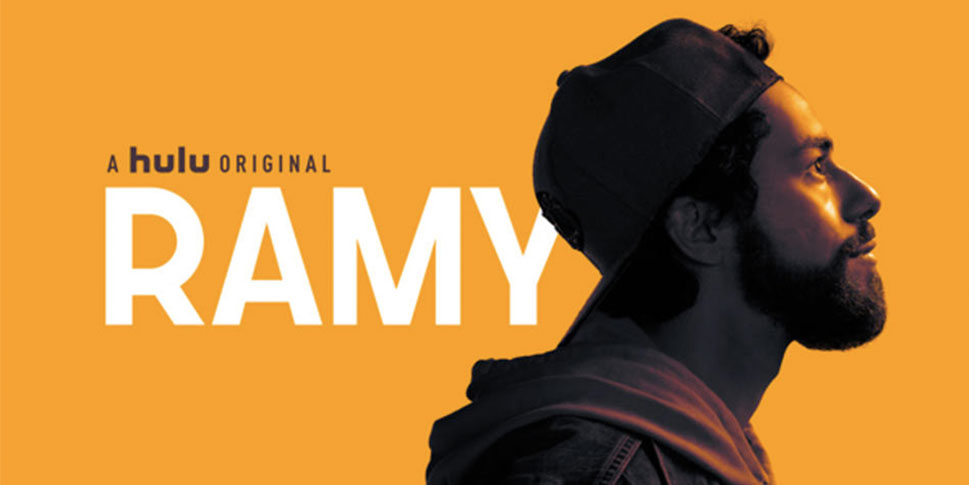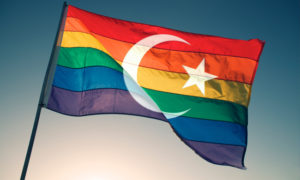Ramy Season Two: Let’s Talk about Sex, Habibi
A review of the show's portrayal of American Muslims and queer identities
 Ramy, whose second season debuted on Hulu May 29th, has already revolutionized the portrayal of Muslims and Arabs on screen. The series, which is the brainchild of stand-up comic Ramy Youssef, passes an Islamic Bechdel test, featuring realistic conversations between Muslims unmediated by a third party, conversations that do not include the typical anger, shame, and plots to undermine the West that have plagued other TV shows. What Muslims create, when in possession of the keys to their own representation, is robust and refreshing.
Ramy, whose second season debuted on Hulu May 29th, has already revolutionized the portrayal of Muslims and Arabs on screen. The series, which is the brainchild of stand-up comic Ramy Youssef, passes an Islamic Bechdel test, featuring realistic conversations between Muslims unmediated by a third party, conversations that do not include the typical anger, shame, and plots to undermine the West that have plagued other TV shows. What Muslims create, when in possession of the keys to their own representation, is robust and refreshing.
Season Two surpasses the revolutionary zeal of season one by tackling sexual issues long thought to be incompatible with Muslim values: pornography, masturbation, and homosexuality, among other spicy topics. As a scholar of sexuality in the Arab world and its Diaspora, I have spent years studying how people in the West perceive Arab immigrants to have problematic attitudes about gender and sexual tolerance. Ramy seemed perfectly poised to shine a positive light on diverse Muslims perspectives about gender and sexuality. While the show does much to dismantle stereotypes about Muslim sexual conservatism, it also sends an unfortunate message about Muslim acceptance and assimilation in the United States: conform to normative American ideals of sexual liberation and gender inclusivity, or risk lifelong unhappiness and exclusion from American society.
Ramy certainly brings fresh and sensitive eyes to questions that are of actual concern to Diaspora Muslims and Arabs: women’s empowerment, inter-racial relationships, the connection between sexual health and mental health, male privilege lingering even in progressive circles, transgender identity, men’s inability to talk about loneliness, and whether marriage is still a good idea. I am going to set aside discussions of where the show excels, and instead hone in on two important ways the show could have more thoughtfully captured the latest developments in Muslims’ thinking about sex and gender. The first is on the question of homosexuality, and whether Muslims who experience same-gender sexual desire must claim a gay identity. The second is the show’s occasional suggestions that Muslim immigrants have “backward” notions about gender and sexuality that must be reformed. The show’s recommendations for greater sexual and gender inclusivity are tips that all Americans would do well to follow, but their targeted nature raises concerns: Ramy’s call for Muslim sexual reform is being made at a time when, more than ever, young Muslims are pushing back against the portrait of Islamic sexual backwardness, calling it part and parcel of the campaign to demonize Muslims in the “War and Terror,” a campaign that borrows heavily from longstanding colonial and Orientalist tropes about Muslim sexual perversity.
Please be advised, the remainder of this article contains spoilers.
Ramy takes off with clear feminist messages, and its best moments belong to women, especially the masterful Hiam Abbas, playing Ramy’s mother Maysa. At first, she seems to be a one-dimensional FOB (fresh off the boat) immigrant, whose sole purpose is to butcher the English language. Her children mock and correct her when she mistranslates millennial speak and pop culture. But her poetic and sincere mistranslations are not mistakes: she is ultimately a witness to what is weird about America, what is not easily translatable. In an episode titled “They,” Maysa grapples with how to translate and make sense of gender-neutral pronouns when she meets a transgender woman for the first time.
By episode’s end, Maysa learns how to use pronouns correctly, but it is a rocky road: her daughter Dena, who is embarrassed by her backwardness, has to “re-educate” her. The drama starts when her mother, who drives Lyft part-time, stresses over a bad review. Dena helps her mother retrace her steps only to find out that her mom had made a stream of politically incorrect comments about passengers’ appearances. Dena, an at times harsh teacher, imparts valuable lessons in inclusivity to help her mom become culturally competent in liberal 2020 America. Maysa regurgitates what she’s learned in a comical but sincere way, querying Muslim guests in her home about their preferred pronouns.
 Maysa’s “reeducation” process was prompted because she repeatedly misgendered her passenger Sophia (who is alternately referred to as “trans” and “non-binary”), asking if she was going to a “costume party.” Her daughter sensitizes her to a culture clash Maysa was oblivious to before this experience: the stereotypical habit of Arab mothers pointing out everything in their children that could use improvement, a practice that can generate offense when applied to strangers, like when Maysa tells her non-binary passenger how to look more “feminine.” Dena makes the offense intelligible for her mother by explaining how her mom’s daily negative comments about her attire ruin what would otherwise be a happy start to each day. “You have no filter, just like Trump” Dena tells her mom, who reacts with a horrified expression, vehemently rejecting the comparison.
Maysa’s “reeducation” process was prompted because she repeatedly misgendered her passenger Sophia (who is alternately referred to as “trans” and “non-binary”), asking if she was going to a “costume party.” Her daughter sensitizes her to a culture clash Maysa was oblivious to before this experience: the stereotypical habit of Arab mothers pointing out everything in their children that could use improvement, a practice that can generate offense when applied to strangers, like when Maysa tells her non-binary passenger how to look more “feminine.” Dena makes the offense intelligible for her mother by explaining how her mom’s daily negative comments about her attire ruin what would otherwise be a happy start to each day. “You have no filter, just like Trump” Dena tells her mom, who reacts with a horrified expression, vehemently rejecting the comparison.
During her struggle to understand gender variance, Maysa uses two languages that have ironically not allowed space for gender neutrality. This becomes evident when, seemingly out of nowhere, Maysa starts cursing in French when she gets tongue-tied trying to use “they/them” pronouns. She sardonically over pronounces the silent S in “ils” (plural “they” in French), to show the absurdity and impossibility of translating singular “they” into romance languages. This scene reminded me of a French quote from a textbook I use in my teaching that aims to explain transatlantic differences: “Asking a French person to behave in a gender-neutral way is like asking them not to breathe.” Meanwhile, all nouns, adjectives, and even some conjugations in Arabic are gendered. Very generally, Arab social norms encourage girls to be feminine and boys to be masculine (but we must also acknowledge the many ways Middle Eastern masculinity cultivates faculties of affection, sensitivity, and emotional expression that depart from Western norms, something the show glosses over). These linguistic and cultural heritages play a part in Maysa’s impulse to impose the male-female binary on non-binary people.
However heart-warming Maysa’s “successful” reeducation, there was an element that gave me pause. The “They” episode is set against a parallel intrigue: Maysa is studying intensely for her American citizenship test, and she wants more than anything to secure voting rights so she can vote that “fuckman” (as she calls him) out of office. Her immigration officer tells her to stay out of trouble until the government approves her application, which means she cannot afford any infractions. Her dilemma with her trans passenger starts here, as Lyft received a complaint that suspended Maysa’s driving privileges pending investigation. Though it turns out that Sophia did not make the complaint that landed Maysa in hot water, the episode focuses on her efforts to eliminate any suspicion of transphobia in order to secure her citizenship. In this way, Maysa must pass a test within her citizenship test: she must show herself to have progressive attitudes about gender, especially as a Muslim woman, in order to gain citizenship. The right-wing country where she is seeking to become a citizen actively undermines trans rights, and yet immigrants must prove their understanding of gender inclusivity in order to gain admission. I was additionally surprised the show made no mention of the fact that, in several Muslim-majority countries, trans identity is relatively more socially acceptable than gay identity, as recent cases in Egypt and Iran have shown.
This equation between civic fitness and tolerance of alternative sexualities and identities was not pulled from the ether: countries like Germany and the Netherlands have introduced citizenship “tests” and mandatory educational modules that make an equivalence between European values and sexual tolerance. Anti-discrimination activists seized on these tests, suspecting they were specifically designed to target Muslims so as to limit their immigration prospects because of an assumption that Muslims are more likely to oppose such things as same-sex marriage. More recently, Milo Yiannopoulos took credit for getting President Trump to propose a strict citizenship test, which thankfully never the saw the light of day, filled with questions about “gayfriendliness” that Muslims, it was assumed, would answer “incorrectly.” The irony of right-wing governments co-opting LGBT rights for xenophobic purposes has a name: sexual nationalism. The same politicians demanding that Muslims drop their sexual phobias are sexist themselves. A show as forward-thinking as Ramy should have known that assessing Muslims in this way has a problematic history.
This testing of gayfriendliness continues with the character of Naseem—Ramy’s sleazy bodybuilding uncle with thinning hair who owns a jewelry store. The portrait is poignant in its exploration of male loneliness, but potentially damaging for the message it sends. Naseem, who is deeply invested in his own manliness, frequents gyms and other testosterone-filled locales that foster male bonding. He has a regular gym buddy, a Latino male with a similar build. Weekly, they exchange sexual favors, under cover of steam in the sauna, without ever using the word “gay.” Naseem’s crisis starts when his buddy stops coming to the gym and Naseem must track him down, afraid for his own loneliness.
 Naseem, and others like him, belong to a group that sociologists have called “MSMs,” that is, men who have sex with men, but who do not associate with the visible gay public or even identify as gay. A decade ago, there was a media panic, some would say a moral panic, about men of color on the “down low” who would have clandestine sex with men while acknowledging attraction to women in their public personas. Were these men hypocrites? Or sexual outliers who refused to embrace the homo-hetero binary? Unbeknownst to many, this binary has never been universally accepted around the world. It is a product of the late 19th and early 20th century period and its enthusiasm for finding and labelling “sexual deviants” in order to reinforce a growing psychological apparatus that aimed not just to categorize sexual preferences, but to create sexual personality “types” based on these preferences where none existed before. Historians of sexuality have explicitly contrasted this Western obsession with classification and sexual disclosure with eastern and Arab cultures that place a greater emphasis on the art of pleasure and eroticism, less invested in naming everything. This historical and cultural divide is the unacknowledged ghost that haunts this episode.
Naseem, and others like him, belong to a group that sociologists have called “MSMs,” that is, men who have sex with men, but who do not associate with the visible gay public or even identify as gay. A decade ago, there was a media panic, some would say a moral panic, about men of color on the “down low” who would have clandestine sex with men while acknowledging attraction to women in their public personas. Were these men hypocrites? Or sexual outliers who refused to embrace the homo-hetero binary? Unbeknownst to many, this binary has never been universally accepted around the world. It is a product of the late 19th and early 20th century period and its enthusiasm for finding and labelling “sexual deviants” in order to reinforce a growing psychological apparatus that aimed not just to categorize sexual preferences, but to create sexual personality “types” based on these preferences where none existed before. Historians of sexuality have explicitly contrasted this Western obsession with classification and sexual disclosure with eastern and Arab cultures that place a greater emphasis on the art of pleasure and eroticism, less invested in naming everything. This historical and cultural divide is the unacknowledged ghost that haunts this episode.
At every moment that Naseem wants to experience pleasure with another man, he faces the pressure to name what he is doing as “gay,” and he refuses to do it. He is unable to recognize himself in younger gay men who dance at hedonistic clubs, even though he makes a sincere but ultimately futile effort to find a solution for his loneliness in those spaces. He is uncomfortable there because his homosexuality is of an entirely different nature: he longs nostalgically for the homosocial environments he left in Cairo, the soldiers’ barracks and devoted male friendships that can sometimes be more loving than a marriage for those involved. He can’t recreate these relationships in the Western spaces designated for gayness. He wants his sexuality to exist within the margins, not outside of them.
Ramy makes it seem that there is an obvious choice for Naseem to make: drop the “façade” of straight-passing masculinity and confess, to himself and his gym buddy, his true sexual identity. The portrayal of Naseem is at first heartbreaking because it shows how lonely life can be for middle-aged immigrants who have not found companionship. If only Naseem would admit to his true nature, he wouldn’t be so sad, the show seems to suggest. Naseem makes a last attempt at gay romance, taking up his gym buddy’s invitation to come over for dinner: it starts well—they watch TV, eat pizza, and share laughs—but ends in violence at the very moment Naseem seems ready to move from loving friendship to gay couplehood. Distraught at his own reaction, Naseem eats his feelings, wolfing down a cake meant for two with the words “deepest sympathies” emblazoned in frosting, while crying on the sidewalk. It is one of the saddest sights I have seen on screen: sad not only because Naseem finds himself isolated and engaging in self-sabotage, but also because he seems to be looking for something he may never find in the United States.
The problem is, the moral of this storyline—that Naseem would be happy if he came out of the closet and embraced a gay identity—overstates the degree to which “out” gay culture is universally embraced, and never once considers how migrants and people of color could put pressure on normative, American definitions of what it is to be gay. What if Naseem were lonely, not because he is a gay man in a straight man’s body, but because he cannot find partners for the homosexual bonding that excites him the most? In Egypt, his sexuality existed comfortably within mainstream society: he was able to seek out same-sex encounters within the frame of ordinary friendships with other men, in a somewhat sex-segregated and homosocial society that enables those kinds of encounters, even if it doesn’t vocally endorse them. In the U.S., he must first admit to being “different,” and confess an “alternative” sexuality when deep down he feels his sexuality is anything but alternative.
Jane Ward, author of Not Gay: Sex between Straight White Men, makes the critical point that, for one to identify as gay, one has to not only practice gay sex, but also be invested in gay culture and public notions of gay love. The straight men she studies—in male orders like fraternities and the Navy—have definitely not signed up for gay identity, even if they repeatedly have sex with other men: as she shows, they are often nostalgic later in life, like Naseem, for a sexuality that evokes memories of sexually charged male bonding from their formative years. It is also the case in Ramy that most of the visible models for “out” homosexuality are white men and seen in public places like nightclubs: all homosexual contact between brown men happens behind closed doors in private.
The message imparted by this episode is dispiriting to those who practice this form of homosexuality and do not recognize themselves in normative, public gay identities. One scene especially stands to harm Muslim viewers who happen to be attracted to the same gender. In it, Naseem reconnects with an old friend, Yassir, who is now married and has “moved on” from the type of fraternal homosexuality he once practiced with Naseem. They share a tender moment catching up on the couch, acknowledging that they are in different places in their lives, and wishing each other happiness for the future. At one point, Yassir says that he had a “choice,” that it could have gone either way, and that he chose to be the way “Allah wants him to be.” There is a moment of hesitation as we see the embers of old passions in Yassir and Naseem’s eyes. Yassir moves toward Naseem, as if to embrace him, but this is a false move: Yassir was merely reaching for the Koran, and suggests that they pray, as if to put an end to this conversation and all its possibilities. Naseem looks at Yassir’s back, his eyes moist, knowing that he lost the friend he loved because his friend finds their love incompatible with a heterosexual way of life.
The desire for sexualized fraternal companionship is not the same thing as homosexual identity, and the conversation between Naseem and Yassir could have ended differently. By having the characters “pray the gay away” with a Koran, while not showing any alternative representations of Muslims who are attracted to the same gender, Ramy suggests that Islam and same-gender desires are fundamentally incompatible.
This is not what I expected from a show that aims to document the creative ways young Muslims in the Diaspora are taking charge of their religious practices. More than ever after the tragic Orlando Pulse nightclub shooting in 2016, Muslim-Americans have been speaking openly about homosexuality and Islam. Homophobia, especially among young Muslims, is slowly disappearing according to Pew research polls (with 52% of U.S. Muslims saying homosexuality should be accepted by society in 2017, up from 27% in 2011). Muslims across the country, at family dinners and in student groups, have been fleshing out the difference between homosexual acts and identities, and figuring out an honest Islamic stance that is not simply an imitation of Western attitudes. This has required investigating the history of sexual diversity in the Middle East—and it is a rich history—without capitulating to the pressures of globalization that aim to impose one form of homosexuality as the sole form: research into the Middle East’s forgotten history of sexual diversity started long before the Pulse shooting, but interest in it grew markedly afterward. There are now numerous researchers who do this work, countless young American Muslims who were at the Orlando vigils, and countless other Muslims who have no problem proclaiming their own queerness and reconciling it with their religion, since queerness is a way of being and not simply a sexual act.
 As with Maysa and her exhortation that religious and sexual minorities have to get together to defeat Trump, new coalitions are forming. For all its innovations and attempts at inclusivity, Ramy failed to include queer Muslims, or even allow characters the opportunity to exist as queer and Muslim. What is a Muslim adolescent who is not willing to give up his family and his entire support system in order to come out of the closet supposed to think when the Muslim show that defines his generation tells him that he has to choose one or the other, that he can’t be both Muslim and queer? There are smart ways out of this dilemma that activists and scholars have articulated. Queer Muslims today are forming their own support groups, recommending inclusive mosques, refining their knowledge of the Koran and Hadith, and forming relationships with one another: any one of these trends would be worth exploring in a future episode of the Golden Globe and Peabody award winning Ramy, which has just been renewed for a third season after glowing reviews.
As with Maysa and her exhortation that religious and sexual minorities have to get together to defeat Trump, new coalitions are forming. For all its innovations and attempts at inclusivity, Ramy failed to include queer Muslims, or even allow characters the opportunity to exist as queer and Muslim. What is a Muslim adolescent who is not willing to give up his family and his entire support system in order to come out of the closet supposed to think when the Muslim show that defines his generation tells him that he has to choose one or the other, that he can’t be both Muslim and queer? There are smart ways out of this dilemma that activists and scholars have articulated. Queer Muslims today are forming their own support groups, recommending inclusive mosques, refining their knowledge of the Koran and Hadith, and forming relationships with one another: any one of these trends would be worth exploring in a future episode of the Golden Globe and Peabody award winning Ramy, which has just been renewed for a third season after glowing reviews.
Ramy is still a breath of fresh air, a therapy, a relief, in the way it embodies the voice of a Muslim generation that contests the previous generation’s excessively rigid approach, using sound Islamic reasoning most of the time. Even as Ramy grapples with trans and gay issues, it succeeds in creating poignant portraits. In a show that for the most part rejects the idea that Muslims must embrace every part of the American way of life, some of the more subliminal messages, however, do underscore the point that Muslims must assimilate to Western sexual values. Ramy missed an opportunity to show the myriad ways that Muslims have and could queer mainstream American sexuality.
Do Arabs and Muslims have nothing to teach the West about love and sexuality, only lessons to learn? Though Muslim masculinities are routinely demonized as aggressive and intolerant, they contain possibilities of same-sex affection and emotional range that expand the rigid confines of normative U.S. masculinities. Homo-erotic strands in literature and song subsist in Middle Eastern heritage and were commonly used to mark cultural differences with the West only decades ago. If we fail to acknowledge this queer potential, we persist in the same amnesia of convenience that dictators and their Western allies are only too happy to encourage, as it disconnects the docile population from a complex and potentially subversive past of gender ambiguity and sexual dissidence. Ignoring what queer Muslims are doing in the present denies their agency in the community, silences the important religious questions they raise, and runs the risk of perpetuating the idea that the age of studied reinterpretation remains locked away in the Islamic past.
Mehammed Amadeus Mack is an Associate Professor at Smith College and the author of Sexagon: Muslims, France, and the Sexualization of National Culture (Fordham University Press, 2017).